Oxford History of the Christian Church (16 vols.)
Digital Logos Edition
Overview
The Oxford History of the Christian Church provides a full survey of Christian churches and their part in humanity’s religious heritage. These accessible and engaging accounts of church history span both the globe and history from apostolic times to the present day. Eminent scholars provide fresh narratives on topics such as the Reformation and the East-West schism, as well as groundbreaking single-volume studies of Christianity in Africa and India. The authors pay particular attention to the place of the church in surrounding society, the institutions of church life, manifestations of popular religion, the link between forms of national culture, and the intellectual tradition within Europe and beyond.
Logos Bible Software connects these 16 volumes with one another, as well as the rest of your resources. Fully indexed books enable near-instant search results and connect concepts throughout your library.

- Accessible yet authoritative volumes assembled by church history experts
- Historical accounts with both global and local perspectives
- Trusted scholarship on topics familiar and foreign, from the Reformation to Indian Christianity
- Title: Oxford History of the Christian Church
- Editors: Henry and Owen Chadwick
- Publisher: Oxford University Press
- Volumes: 16
- Pages: 9,854
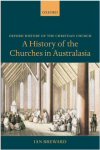
This pioneering study of Christianity in Australia, New Zealand, and the Pacific Islands, opens up new perspectives on Christianization and modernization in this richly complex region. The reception of Christianity into Pacific cultures has produced strongly Christian societies. Based on research in widely scattered archives, this book not only deals with regional interactions but pays careful attention to developments in microstates and to the variety of indigenous religious movements, which were earlier regarded as deviations from Christian orthodoxy but are now seen as significant adaptations of Christian teaching. In Australia and New Zealand, European Christian beginnings have been given local emphases, producing Churches with distinctive identities.
Breward emphasizes lay leadership—not only in the Churches but as part of the Christian presence in the realms of politics, business, and culture. The broad liturgical, theological, constitutional, and pastoral developments of the nineteenth and twentieth centuries are mapped to show the striking changes which have taken place since the 1960s. The dynamics of religious change and conflict, the ambiguities of religious authority, and the destructive effects of Christian colonialism on indigenous communities, especially Australian aborigines, are all dealt with frankly.
Breward explores the decline of the institutional impact of the churches in Australia and New Zealand, as well as the growth of partnership between government and Churches in education, social welfare, and overseas aid and development. Interchange in personnel and ideas is strikingly illustrated in the missionary activities of the regional Churches and their cultural impact.
Breward's involvement in church and community leadership, ecumenism, and theological education makes this volume in the Oxford History of the Christian Church a valuable addition to the series, describing both continuities with world Christianity and little-known local developments.
A work which makes intelligible and accessible a great variety of scholarship . . . It will clearly be the standard work on the subject for years to come.
—Colloquium
Ian Breward is emeritus professor of church history and senior fellow in the history department at the University of Melbourne.
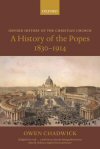
Could a Pope ever consent to be the subject of a political power? Owen Chadwick presents an analysis of the causes and consequences of the end of the historic Papal State. Chadwick examines the psychological pressures upon old Rome as it came under attack from the Italian Risorgimento, liberal movements in Germany, France, Spain, and Portugal, as well as Tsarist Russia as it oppressed its Polish subjects. If a united Italy was to be achieved, the State must disappear.
These pressures caused Popes to resist “the world” rather than to try to influence it, to make the Vatican more of a sanctuary behind high walls, and to preach the more otherworldly aspects of the Catholic faith. At the same time, they met new moral demands—the rights of the laborer in industry, divorce, toleration—which they could confront because revolution had destroyed the powers of the Catholic kings over their churches, and therefore Catholic authority could be far more centralized in Rome.
Professor Chadwick writes with a sensitive empathy with the Roman Catholic mind. A well-organised index and a copious descriptive bibliography complete this magisterial and entertaining monograph.
—Journal of Ecclesiastical History
Owen Chadwick is emeritus regius professor of modern history at the University of Cambridge.
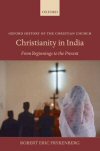
Robert Frykenberg’s insightful study explores and enhances historical understandings of Christian communities, cultures, and institutions within the Indian world from their beginnings to the present. Examining a newly emerging world Christianity,—in which Western Christians are a minority—Frykenberg has focused upon those transcultural interactions within Hindu and Muslim environments that have distinguished Christians in this part of the world. This book seeks to uncover various complexities in the proliferation of Christianity in its many forms and to examine processes by which Christian elements intermingled with indigenous cultures and which resulted in multiple identities, and also left imprints upon various cultures of India.
Thomas Christians believe that the Apostle Thomas came to India in 52 AD, and that he left seven congregations to carry on the mission of bringing the Gospel to India. In our day the impulse of this mission is more alive than ever. Catholics, in three hierarchies, have become most numerous and various Evangelicals/Protestant communities constitute the third great tradition. With the rise of Pentecostalism, a fourth great wave of Christian expansion in India has occurred. Starting with movements that began a century ago, there are now 10 to 15 times more missionaries than ever before, virtually all of them Indian. Needless to say, Christianity in India is profoundly Indian and Frykenberg provides a fascinating guide to its unique history and practice.
This is the best single-volume history of Christianity in India written so far. It is both genuinely Indo-centric and genuinely ecumenical.
—John C. B. Webster, International Bulletin of Missionary Research
Robert Eric Frykenberg is professor emeritus of history and South Asian studies at the University of Wisconsin, Madison.
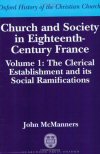
This volume begins with an overview section which covers church and state, the theology and political theory justifying their alliance, the wealth of the clergy and their assemblies voting taxation, their role in the official life of the nation, from the court at Versailles to army barracks, warships, and prisons. Then author John McManners presents the complex structure of dioceses and parishes and the variety of monastic institutions (where the enjoyment of misapplied wealth contrasted with the austere dedication which ensured the education of the children and the care of the sick throughout the land). There is an evocation of the life-style of the clergy from the palaces of the aristocratic bishops and the cathedral closes of comfortable canons to the humblest tumbledown nunnery, with a gallery of portraits analyzing clerical motives and vocations. A multitude of lay folk come onto the scene, aristocrats battening on monastic revenues, lawyers threading the labyrinth of benefice law, estate managers, musicians, vergers and officials of every kind; many families' existence assumed the availability of ecclesiastical offices for their children—the privileges of different classes in society reflected in an institution devoted to spiritual ends.
[A] magisterial two-volume history of the church in eighteenth-century France . . . Rarely has history been written with such ease and thoroughness. Professor McManners combines scholarly detachment with sympathy to produce a thoroughly readable history, one that will not be superseded for many a day.
—Contemporary Review
John McManners is regius professor emeritus of ecclesiastical history, fellow, and chaplain at All Souls College, Oxford.
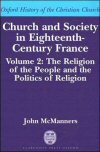
This second volume begins with a section on the religion of the people. The clergy offered the liturgical services, sermons, evangelistic missions, and the offices sanctifying birth, marriage, and death; distinctions are made between what they intended and how their ministrations were popularly interpreted and incorporated into the social order. McManners evaluates statistical soundings concerning the extent of religious practice and the degree of conviction involved. Further chapters deal with processions, pilgrimages, and popular practices and superstitions, with hermits and confraternities, with the impact of reading the Bible and other edifying literature in an age of increasing literacy. Finally comes a view of the twilight world of magic and sorcery. Throughout this section the comments of theologians and thinkers of the enlightenment are recorded, whether in agreement or contradiction.
The next section deals with the efficacy of the confessional and the role of the casuistry of the Church in attempting to mold sexual mores, business practices, and the world of the theatre.
In the next two sections, the role of religious issues in political affairs is detailed. An overview of the Jansenist quarrel and of the activities of the Jesuits brings in the story of the struggle between crown and parliament, while an extended portrayal of the life of the protestant and Jewish communities leads to the history of the debate on toleration, involving the Gallican Church in political interventions and controversy.
Professor McManners has produced an outstanding history of religion and its social context in the hundred years before the French Revolution. As his many admirers will have come to expect, it contains broad and challenging arguments, illustrated by vivid detailed examples, and is always eminently readable.
—Huguenot Society Proceedings
John McManners is regius professor emeritus of ecclesiastical history, fellow, and chaplain at All Souls College, Oxford.
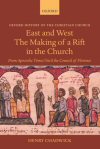
The greatest Christian split of all has been that between east and west—between Roman Catholic and Eastern Orthodox—a rift that is still apparent today. In East and West, Henry Chadwick provides a compelling and balanced account of the emergence of divisions between Rome and Constantinople. Drawing on his encyclopedic command of the literature, he starts with the roots of the divergence in apostolic times and takes the story to the fifteenth-century Council of Florence.
Henry Chadwick’s years of experience as an ecumenicist inform his discussion of Christians in relation to each other, to Jews, and to non-Christian gentiles. He displays a distinctive concern for the factors—theological, personal, political, and cultural—that caused division in the church. His masterly exposition of the complex issues discussed at the Ecumenical Councils is characteristically clear and fair. This is a work of immense learning, written with sensitivity and spirit. Its fascinating detail and full analysis make it invaluable to anyone interested in how this lasting rift in the Church developed.
This kaleidoscope of evidence is presented with deftness and judgment, a minimum of comment and summary, and a truly magisterial command of a huge subject.
—The Journal of Ecclesiastical History
Henry Chadwick was emeritus regius professor of divinity at the University of Cambridge.

Keith Robbins, building on his previous writing on the modern history of the interlocking but distinctive territories of the British Isles, takes a wide-ranging, innovative, and challenging look at the twentieth-century history of the main bodies, at once national and universal, which have collectively constituted the Christian church. Robbins emphasizes the protracted search for elusive unity, locates particular beliefs, attitudes, policies, and structures in their social and cultural contexts, and scrutinizes prominent individuals, clerical and lay. Religion and politics intermingle, highlighting, for churches and states, fundamental questions of identity and allegiance, of public and private values, in a century of ideological conflict, violent confrontation (in Ireland), two world wars, and the protracted Cold War.
The massive change experienced by the countries and people of the Isles since 1900 has encompassed shifting relationships between England, Ireland (and Northern Ireland), Scotland and Wales, the end of the British Empire, the emergence of a new Europe, and, more recently, a massive influx of Muslims, Hindus, Sikhs, and other faiths from outside Europe: developments scarcely conceivable a hundred years earlier. Such a broad contextual perspective provides an essential background to understanding the puzzling ambiguities evident both in secularization and enduring Christian faith. Robbins provides a cogent and compelling overview of this turbulent century for the churches of the Isles.
A superb overview of the development and activity of the main bodies within the Church...Covers a vast amount of ground...Local and regional historians will find the work and indispensable framework, as well as a sure guide.
—Northern History
Keith Robbins is emeritus vice-chancellor, at the University of Wales, Lampeter.

This book is the first history in English of the Lutheran Church in Germany and Scandinavia in the eighteenth and nineteenth centuries. A period of fundamental and lasting change in the political landscape with the separation of the old twin monarchies of Sweden-Finland and Denmark-Norway in Scandinavia (1808, 1814), and the unification of Germany (1866-71), this was also a time of particular unease and upheaval for the church. Attempts to emulate the spiritual community of the early church, reform of the church establishment, and steps taken to enlighten parishioners were almost always held back by the anomalous structural legacy of the Reformation, tradition, and parish habit, sacred and profane. However, the birth of the modern nation-state and its market economy posed a fundamental challenge to the structure and ethos of the Reformation churches, as it did to the Catholic Church. The First World War deepened the crisis further: German Protestants (and the Scandinavians were not immune either, although they remained neutral), who bracketed modernity with crisis and religion with national renewal, and who saw national loyalty as a higher value than the faith, fellowship, and moral order of the church, were swept up into the maw of a modern national war machine which threatened to wipe out Protestantism altogether.
This is a work of very special character . . . a work of fine nuances, a study in which the complicated network of the post-Reformation ecclesiastical situation in Germany and Scandinavia is explored by means of approaching it from various different angles. . . . Throughout the work, personal and collective forms of devotional life receive much attention . . . This is a rich book; all the more interesting because of its idiosyncratic structure. It is not a manual in the traditional sense . . . [It is] a work which, just because of its originality, may be considered a valuable addition to the steadily expanding Oxford History of the Christian Church.
—Journal of Theological Studies
Nicholas Hope is reader in history at University of Glasgow, and visiting fellow at University of Heidelberg.
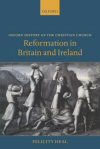
The study of the Reformation in England, Wales, Ireland, and Scotland has usually been treated by historians as a series of discrete national stories. Reformation in Britain and Ireland draws upon the growing genre of writing about British history to construct an innovative narrative of religious change in the four nations. Felicity Heal uses a broadly chronological framework to consider the strengths and weaknesses of the pre-reformation churches, the political crises of the break with Rome, the development of Protestantism, and changes in popular religious culture. The tools of conversion—the Bible, preaching, and catechism—are accorded specific attention, as is doctrinal change. Heal argues that political calculations did the most to determine the success or failure of reformation, though the ideological commitment of a clerical elite was also of central significance.
Felicity Heal is a lecturer in modern history at the University of Oxford and fellow of Jesus College.

Professor Rupp looks at the consequences of the Revolution of 1688, including the Toleration Act and the schism created by those who felt bound in conscience not to accept the new monarchy. He asks how the alliance between church and state affected the establishment, and how party politics modified its attitudes and sought to silence its independent voice. He describes the life and worship of the churches, the survival of intolerance despite the principle of toleration, the growth of the dissenting churches, and the predicament of Roman Catholics.
These essays, so full of insight and scholarship, constitute an important work which no student of eighteenth-century religion can ignore.
—English History Review
Gordon Rupp was a Methodist preacher, historian, and scholar. He was Dixie Professor of Ecclesiastical History at the University of Cambridge.
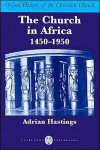
Christianity provided the constitutive identity of historic Ethiopia. From the sixteenth century, and increasingly from the nineteenth, Christianity entered decisively into the life and culture of an increasing number of other African peoples. In the course of the twentieth century, African Christians have become a major part of the world church, and arguably modern African history as a whole is not intelligible without its powerful Christian element. Yet despite the great advance in African historiography over the last 40 years, this is the first major volume to consider the historical development and character of the Christian church in Africa as a whole, linking together Ethiopian Orthodoxy, Roman Catholicism, Protestantism, and the numerous independent churches of modern times. Adrian Hastings focuses on the role of conversion, the shaping of Church life and its relationship to traditional values, and the impact of political power. Hastings also compares the relation of Christian history to the comparable development of Islam in Africa.
This first comprehensive history of the church in Africa . . . is a magnificent contribution to the Oxford History of the Christian Church and will be welcomed by Africanists as well as by church and mission historians.
—Expository Times
Adrian Hastings is professor of theology and head of the department of theology and religious studies at the University of Leeds.
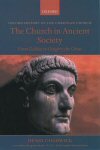
The Church in Ancient Society provides a full and enjoyable narrative history of the first six centuries of the Christian church. Ancient Greek and Roman society had many gods and an addiction to astrology and divination. This introduction to the period traces the process by which Christianity changed this and so provided a foundation for the modern world; the teaching of Jesus created a lasting community, which grew even to command the allegiance of the Roman emperor. Chadwick discusses Christianity in relation to how it appeared to both Jews and pagans, and how Christian doctrine and practice were shaped in relation to Greco-Roman culture and the Jewish matrix. Among the major figures Chadwick discusses are Tertullian, Clement of Alexandria, Origen, Constantine, Julian the Apostate, Basil of Caesarea, Ambrose of Milan, and Augustine.
Following a chronological approach, Henry Chadwick’s clearly exposits important texts and theological debates in their historical context in unrivalled detail. In particular, he examines theological and ecclesial texts in relation to the behavior and beliefs of people who attended churches and synagogues. Christians did not find agreement and unity easy and Chadwick displays a distinctive concern for the factors—theological, personal, and political—which caused division in the church and prevented reconciliation. The emperors, however, began to foster unity for political reasons and chose monotheism. Finally, the Church captured society.
The book is a tour de force to which we will keep turning as an essential reference work.
—R.A. Markus, The Tablet
Henry Chadwick was emeritus regius professor of divinity at the University of Cambridge.
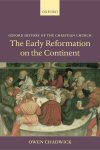
The Early Reformation on the Continent offers a fresh look at the formative years of the European reformation and the origins of Protestant faith and practice. Taking into account recent work on Erasmus and Luther, Owen Chadwick handles these and numerous other figures with sensitivity and understanding. Emphasis on the context provides a balanced view of the raison d'être for the changes the reforming communities sought to introduce and the difficulties and disagreements that followed.
The structure of the book is distinctively original. Rather than following a conventional chronological progression, Owen Chadwick takes a much broader perspective and arranges his material thematically. Whatever the topic—the Bible, clerical celibacy, moral questions of adultery and divorce, purgatory, hymns, excommunication, the relationship of church and state, education, the Eucharist—the reader is taken back to its origins and development through the history of the western church and given an authoritative, accessible, and informative account.
[This] is the most detailed English work to date in this field . . . it provides essential background for anyone who wishes to understand the significant political and spiritual contributions made by the papacy in the twentieth century. . . . This book should remain a standard in the field of papal studies for years to come.
—J. Francis Watson, History
Owen Chadwick is emeritus regius professor of modern history at University of Cambridge.

This survey of the development of the Frankish church under the Merovingian and Carolingian kings (approximately 500–900) is the first of its kind to appear in English. It is not a story of unimpeded advance towards the Church of medieval France but rather of painful adaptation. It takes account of unsolved problems: the reaction of the Church to heresy, to Judaism, to the Frankish ethos of marriage, and to the conversion of peoples outside Francia. Special attention is paid to the intellectual interests of churchmen and to the role of the vernacular in transmitting the Christian message to clergy and laity whose Latin was negligible.
Much turned on the authority of a succession of rulers who combined deep piety with material needs that were inimical to the Church's position as a great landowner. The advance of the Church was thus hesitant and often balked. What emerges is the churchmen’s increasing resolve to unite against the pressures of lay domination, and to press forward with their basic duties as converters and teachers.
J. M. Wallace-Hadrill was Chichele Professor of Modern History at University of Oxford and a fellow at All Souls College.
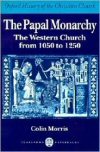
The two centuries covered in this volume were among the Church’s most creative. Colin Morris charts the emergence of much that is considered characteristic of European culture and religion, including universities, commercial cities, the crusades, the friars, chivalry, marriage, and church architecture. In all these developments, the Roman Church played an important and often fundamental role. A re-evaluation of that role is now particularly apt given the dissolution of Christendom in its old form witnessed by today’s generation.
Professor Morris has written a massively impressive book. It is difficult to know what to praise first: its comprehensive coverage, its masterful synthesis, its relentless good sense, or its felicitous prose . . . a superb book that will for a very long time dominate teaching and thinking about the church in the high Middle Ages.
—Times Higher Education Supplement
Colin Morris is professor of medieval history at the University of Southampton.
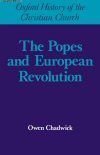
Owen Chadwick describes the effects of the European Revolution of 1789–1815 on the papacy, and compares Catholic Church of the ancient régime to that of the early-nineteenth century. Chadwick shows how strongly the counter-reformation still worked in Italy during the eighteenth century, how it was the constitutional development of states—rather than the incoming of new ideas—which forced change, and how traditional the Catholic world was even in the age of the enlightenment. Chadwick shows reform at work, and the fierce pressure on the Papacy marked first in the forced suppression of the Jesuits and afterwards in the kidnapping of two successive popes by French governments. He shows how revolution in Italy affected church structures and brought on peasant war, yet encouraged, in a radical form, some improvements of church life towards which the earlier reformers had striven. Finally, Chadwick shows the political swing of the Restoration after the fall of Napoleon, the way in which the church was already associated with the political right, the great difficulties of restoring church life after the evolutionary years, and the persistence, half unnoticed, of the earlier reforming ideas among Catholics.
Owen Chadwick is emeritus regius professor of modern history at the University of Cambridge.
Henry Chadwick was a leading historian of the early church and was appointed regius professor at both the universities of Oxford and Cambridge.
Owen Chadwick is a prominent historian of Christianity and was regius professor of modern history at Cambridge.
Reviews
5 ratings

Jeff O'Neal
9/28/2016
Apparently throwing in a book authored by a female enhances its value to most of churchianity today where the idol of feminism reigns supreme. But the Bible is not the least bit unclear about whether a woman should speak, teach, or exercise authority in the ekklesia.


Faithlife User
2/28/2014

Thomas F. Shea
2/25/2014
What a fabulous collection!!! The price is right for a parish library. In fact, the price is almost a "giveaway" for these volumes with the incredible study enhancement of Logos thrown in. Unfortunately, it's out of my range on a fixed income. I hope that the $399 price tag speeds it into production for those who have been able to pre-order it.